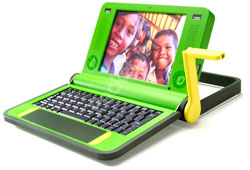
MIT has unveiled the production version of Negroponte’s $100 laptop. It’s hard to express how happy I am. It has the potential to make a huge difference in terms of African connectivity. Not just for education but in terms of an expanded business base and a route for freedom of speech.
My interest lies mostly in some research I did for my alternative practicum at teacher’s college. I was looking into the possibilities for internet aided learning in remoter regions of Sierra Leone. Cell coverage is spotty, but it’s improving by the day with new telecomm service. So, getting a data connection is possible, the harder part is maintaining an adequate power supply for your computing equipment. That makes that hand-crank on the laptop one of the most important features.
I investigated a number of solutions, eventually settling on handheld pdas and portable solar arrays. The power consumption is fairly minimal, the batteries are rechargable and you have the possibility of using a laptop as a central base-station. The laptops and/or pdas could come from anyone really. There are relatively inexpensive portable solar arrays available now that are capable of powering most of those devices. My ideas were partially inspired by Ben Saunders’ trek to the arctic and his blogging via pda (he used this rollable solar array).
The Junction Box is also an amazing piece of hardware. Combining a few of Negroponte’s laptops and portable Wifi router with direct cell-network capabilities creates some pretty cool options — like a mobile classroom. You could slap one of those in a jeep, but a pile of laptops in the trunk and drive around from school to school.
One option for larger centers in Africa is recycled computing. We throw out a lot of electronic crap in North America, most of it is still entirely usable. Mark Elliott has an amazing computer recycling program running up at Sharbot Lake. It is a high-school class, so the kids get credit, but it operates more like a mini Dell, filling huge orders for recycled computers.
Recycled computing does pose some problems that I hadn’t really considered. When I visited the recycling program with a former child soldier from Sierra Leone, he pointed out two important things. One you need people to guard your shipping containers to ensure they actually reach their destination. Two, in remoter areas you will need 24 hour guards to protect permanent solar installations because they will be stolen. He was spent time studying at U of T and is now working to bring more computers into the country.
To most of us the concept of an electronic textbook is kind of blase because we have perfectly functional text versions. A self-powered electronic device with tons of information available to it is invaluable to a teacher with nothing. It’ll be interesting to see how teachers make use of the laptops.
All-in-all there are some pretty amazing things going on right now in terms of low-cost computing. Hopefully, we’re ushering in a bright new future.
Update: a related Wired interview with John Negroponte
